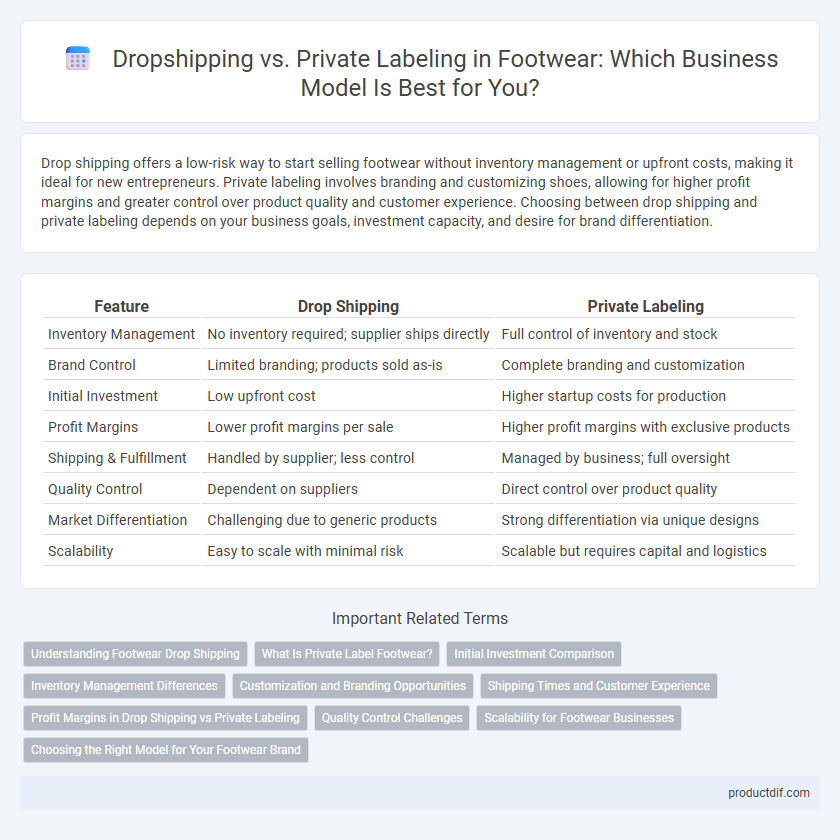Drop shipping offers a low-risk way to start selling footwear without inventory management or upfront costs, making it ideal for new entrepreneurs. Private labeling involves branding and customizing shoes, allowing for higher profit margins and greater control over product quality and customer experience. Choosing between drop shipping and private labeling depends on your business goals, investment capacity, and desire for brand differentiation.
Table of Comparison
| Feature | Drop Shipping | Private Labeling |
|---|---|---|
| Inventory Management | No inventory required; supplier ships directly | Full control of inventory and stock |
| Brand Control | Limited branding; products sold as-is | Complete branding and customization |
| Initial Investment | Low upfront cost | Higher startup costs for production |
| Profit Margins | Lower profit margins per sale | Higher profit margins with exclusive products |
| Shipping & Fulfillment | Handled by supplier; less control | Managed by business; full oversight |
| Quality Control | Dependent on suppliers | Direct control over product quality |
| Market Differentiation | Challenging due to generic products | Strong differentiation via unique designs |
| Scalability | Easy to scale with minimal risk | Scalable but requires capital and logistics |
Understanding Footwear Drop Shipping
Footwear drop shipping allows retailers to sell products without holding inventory, leveraging suppliers who handle storage and shipping directly to customers. This model reduces upfront costs and minimizes risk, making it ideal for testing new shoe styles or trends quickly. However, control over branding and product quality is limited compared to private labeling, where retailers invest in custom-designed footwear to build brand identity.
What Is Private Label Footwear?
Private label footwear involves designing and branding shoes produced by third-party manufacturers, allowing businesses to sell unique products under their own label without managing production. This approach enables retailers to control brand identity, customize styles and materials, and build customer loyalty through exclusive offerings. Unlike drop shipping, private labeling requires inventory investment but offers higher profit margins and greater market differentiation in the competitive footwear industry.
Initial Investment Comparison
Dropshipping in footwear typically requires minimal initial investment since inventory management and shipping are handled by third-party suppliers. Private labeling demands higher upfront costs, including product development, bulk inventory purchase, branding, and packaging. Entrepreneurs looking for lower financial risk often prefer dropshipping, while those aiming for brand control and higher margins select private labeling despite the increased initial investment.
Inventory Management Differences
Drop shipping in footwear eliminates the need for holding inventory by relying on suppliers to ship products directly to customers, minimizing upfront investment and storage costs. Private labeling requires managing inventory in-house, giving brands control over stock levels, quality, and packaging to ensure a consistent customer experience. Efficient inventory management in private labeling reduces risks of overstocking or stockouts, while drop shipping depends heavily on supplier reliability for product availability.
Customization and Branding Opportunities
Private labeling in footwear offers extensive customization options, allowing brands to design unique shoe styles, colors, and materials that align with their specific market identity. Drop shipping typically limits customization, as products are pre-made by suppliers, restricting branding opportunities and unique design features. By choosing private labeling, businesses gain full control over branding elements such as logos, packaging, and exclusive product lines, enhancing brand recognition and customer loyalty.
Shipping Times and Customer Experience
Drop shipping in footwear offers faster shipping times by directly sourcing products from suppliers, reducing inventory management but often resulting in inconsistent packaging and brand presentation. Private labeling requires longer lead times due to inventory production and warehousing but enhances the customer experience through personalized branding and reliable quality control. Choosing private labeling can build stronger brand loyalty, while drop shipping provides agility and lower upfront costs for faster market entry.
Profit Margins in Drop Shipping vs Private Labeling
Profit margins in drop shipping footwear typically range from 15% to 30%, as sellers avoid inventory costs but face lower control over pricing and branding. Private labeling offers higher profit margins, often between 40% and 60%, by allowing businesses to customize products and build brand equity, though it requires upfront investment in manufacturing and inventory. The trade-off between lower risk in drop shipping and greater margin potential in private labeling significantly impacts long-term profitability strategies in the footwear market.
Quality Control Challenges
Drop shipping in footwear often encounters quality control challenges due to limited oversight on product manufacturing and inconsistent materials, leading to potential customer dissatisfaction. Private labeling allows brands to maintain stricter quality standards by directly managing production processes, ensuring consistent durability and comfort in every shoe. However, private labeling demands rigorous supplier vetting and continuous inspections to uphold brand reputation and minimize defects.
Scalability for Footwear Businesses
Drop shipping offers scalability for footwear businesses by minimizing upfront inventory costs and enabling rapid expansion across diverse styles and brands without warehousing constraints. Private labeling requires more initial investment in product development and inventory but allows greater control over brand identity and profit margins, supporting sustainable long-term scalability. Optimizing supply chain logistics and marketing strategies is crucial for both models to effectively scale in the competitive footwear market.
Choosing the Right Model for Your Footwear Brand
Selecting the right business model for your footwear brand hinges on your control over product quality and brand identity. Drop shipping offers low startup costs and minimal inventory risks, while private labeling provides greater customization and long-term brand equity. Evaluating factors like profit margins, supply chain reliability, and marketing strategy ensures alignment with your brand goals and customer expectations.
Drop shipping vs private labeling Infographic

 productdif.com
productdif.com